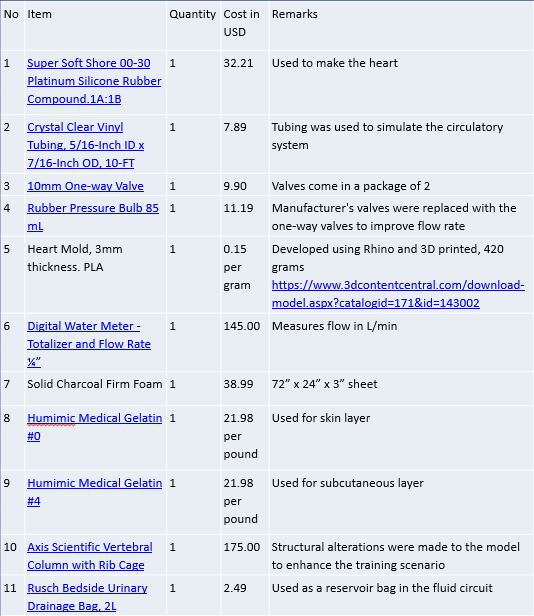2019 FSA Posters
P008: A LOW COST TASK TRAINER FOR OPEN CHEST CARDIAC MASSAGE TRAINING
William Sutton, Jonathan Wakim, Anthony DeStephens, MSME, Thomas Beaver, MD, George Arnatoukis, MD, Sean Kiley, MD; University of Florida
Introduction: On rare occasions, open cardiac massage may be performed in the Intensive Care Unit on patients who have recently had a sternotomy and are in cardiac arrest. Since open cardiac massage is not a commonly performed procedure, intensivists and ICU staff may be hesitant to perform it and are potentially unfamiliar with the equipment necessary or available at their institution. Unfortunately, open cardiac massage simulators are scarce, expensive to obtain, require the ongoing purchase of relatively high-cost consumables for continued use, and do not give any feedback to the learner. Likewise, there is a scarcity and high cost associated with the use of cadavers for such training and practice. Therefore, we have implemented a low cost, easy to produce, and sufficiently realistic simulation task trainer to help fill this gap and describe its use.
Methods/Assembly: Our model was assembled using supplies that were both readily available in our lab and free or inexpensive to obtain. A skeletal anatomy model was modified to contain only the spine (cervical, thoracic and lumbar) and rib cage. The sternum was cut open to emulate a sternotomy and then put back together using surgical wiring. Free 3D heart models are available on online repositories of CAD files. The heart model was scaled using a CAD program (Rhinoceros 6.0) to allow the pressure bulb to fit inside. Using Rhinoceros, a heart mold was designed and 3D printed out of PLA. A pressure bulb fitted with two 10 mm diameter one-way valves at the inlet and outlet to ensure one way flow was positioned within the mold. We then poured in a silicone mixture to create the physical heart. A Foley bag served as the water reservoir and the heart circuit was connected to a flow meter once it was primed. The flow meter was calibrated to simulate a stroke volume of around 60 mL with quality compressions. Two sheets of different density ballistics gel were made and placed over the sternum to simulate different layers of skin. We then cut a rectangular window out of an old chest skin from an airway mannequin and wrapped it around the rib cage of our model.
Table 1. Materials list and associated costs

Figure 1. Cardiac Massage Simulator with flow meter.

Figure 2. Opened Cardiac Massage Simulator
Results: This task trainer lends itself well to practicing open cardiac massage. The response to the trainer has been universally positive from those intensivists (Anesthesia and Surgery) who have tried it.
Discussion: We believe that the task trainer described is comparatively easy and inexpensive to make. Furthermore, adding the functionality of providing learner feedback by measuring the cardiac output of each compression differentiates this simulator from others that are available commercially. Deliberate practice of open chest cardiac massage techniques provided by the task trainer will help increase familiarity and confidence with performing such techniques. We are currently working on the protocol for a future study to see if our simulator can improve learner confidence and performance of open cardiac massage.

